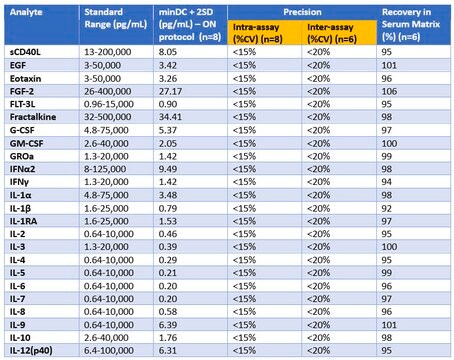HANG2MAG-12K
MILLIPLEX® Human Angiogenesis Panel 2, HANG2MAG-12K
Angiogenesis Bead-Based Multiplex Assays using the Luminex technology enables the simultaneous analysis of multiple angiogenic biomarkers in human serum, plasma and cell culture samples.
About This Item
Recommended Products
Quality Level
species reactivity
human
manufacturer/tradename
Milliplex®
assay range
accuracy: 88-97%
standard curve range: 137-100,000 pg/mL
(Thrombospondin-2)
standard curve range: 137-100,000 pg/mL
(sVEGFR2)
standard curve range: 137-100,000 pg/mL
(suPAR)
standard curve range: 14-10,000 pg/mL
(sAXL)
standard curve range: 14-10,000 pg/mL
(sHER3)
standard curve range: 14-10,000 pg/mL
(sVEGFR1)
standard curve range: 27-20,000 pg/mL
(sIL-6Rα)
standard curve range: 27-20,000 pg/mL
(sPECAM-1)
standard curve range: 27-20,000 pg/mL
(sTIE-2)
standard curve range: 274-200,000 pg/mL
(Angiostatin)
standard curve range: 274-200,000 pg/mL
(sE-Selectin)
standard curve range: 274-200,000 pg/mL
(sNeuropilin-1)
standard curve range: 41-30,000 pg/mL
(Osteopontin (OPN))
standard curve range: 41-30,000 pg/mL
(sEGFR)
standard curve range: 41-30,000 pg/mL
(sHER2)
standard curve range: 41-30,000 pg/mL
(sc-Kit/sSCFR)
standard curve range: 412-300,000 pg/mL
(sVEGFR3)
standard curve range: 69-50,000 pg/mL
(sHGFR)
standard curve range: 7-5,000 pg/mL
(PDGF-AB/BB)
technique(s)
multiplexing: suitable
detection method
fluorometric (Luminex xMAP)
shipped in
wet ice
General description
MILLIPLEX® Human Angiogenesis Magnetic Bead Panel 2 is a 19-plex kit to be used for the simultaneous quantification of any or all of the following analytes in serum, plasma, cell culture samples, and tissue homogenates/lysates: Angiostatin, soluble E-Selectin, (sE-Selectin), Osteopontin (OPN), Platelet Derived Growth Factor-AB/BB (PDGF-AB/BB), soluble Platelet Endothelial Cell Adhesion Molecule-1 (sPECAM-1), Thrombospondin-2 (TSP-2), soluble AXL (sAXL), soluble c-Kit/Stem Cell Growth Factor Receptor (sc-Kit/SCFR), soluble Epidermal Growth Factor Receptor (sEGFR)†, soluble Human Epidermal Growth Factor Receptor 2 (sHer2), soluble Human Epidermal Growth Factor Receptor 3 (sHer3), soluble Hepatocyte Growth Factor Receptor/c-Met (sHGFR/c-Met), soluble IL-6Rα, soluble Neuropilin-1 (sNRP-1), soluble Tie-2 (sTie-2), soluble Urokinase-type Plasminogen Activator Receptor (suPAR), soluble Vascular Endothelial Growth Factor Receptor 1 (sVEGFR1), soluble Vascular Endothelial Growth Factor Receptor 2 (sVEGFR2), and soluble Vascular Endothelial Growth Factor Receptor 3 (sVEGFR3). This kit uses a 96-well format, contains a lyophilized standard cocktail, two internal assay quality controls and can measure up to 38 samples in duplicate.
†Antibody against active site results in preferential binding to unbound EGFR.
The Luminex® xMAP® platform uses a magnetic bead immunoassay format for ideal speed and sensitivity to quantitate multiple analytes simultaneously, dramatically improving productivity while conserving valuable sample volume.
Panel Type: Circulating Cancer
Application
- Analytes: Angiostatin, soluble AXL (sAXL) , soluble c-Kit/Stem Cell Growth Factor Receptor (sc-Kit/SCFR), soluble E-Selectin (sE-Selectin), soluble Epidermal Growth Factor Receptor (sEGFR/sErbB1/sHER1)†, soluble Human Epidermal Growth Factor Receptor 2 (sHer2/sHER2/sErbB2), soluble Human Epidermal Growth Factor Receptor 3 (sHer3/ sHER3 / sErbB3), soluble Hepatocyte Growth Factor Receptor (sHGFR/c-Met/sc-Met), soluble IL-6Rα (IL-6Rα (soluble)/sIL-6Rα), soluble Neuropilin-1 (sNRP-1), Osteopontin (OPN), Platelet Derived Growth Factor-AB/BB (PDGF-AB/BB), soluble Platelet Endothelial Cell Adhesion Molecule-1 (sPECAM-1/sCD31), Thrombospondin-2 (TSP-2), soluble Tie-2 (sTie-2), soluble Urokinase-type Plasminogen Activator Receptor (suPAR), soluble Vascular Endothelial Growth Factor Receptor 1 (soluble VEGFR1, sVEGFR1/ sFlt-1), soluble Vascular Endothelial Growth Factor Receptor 2 (soluble VEGFR2/sVEGFR2/ sKDR/sFlk-1), soluble Vascular Endothelial Growth Factor Receptor 3 (soluble VEGFR3/sVEGFR3/ sFlt-4).
- †Antibody against active site results in preferential binding to unbound EGFR.
- Recommended Sample Type: Human serum, plasma, cell culture supernatants and tissue/cell homogenates/lysates
- Recommended Sample Dilution: 25 μL per well of 1:5 diluted plasma or serum; cell culture supernatant may be used undiluted or diluted with appropriate control medium
- Assay Run Time: Overnight (16-18 hours) at 2-8°C
- Research Category: Cancer
Features and Benefits
Other Notes
Legal Information
Signal Word
Danger
Hazard Statements
Precautionary Statements
Hazard Classifications
Acute Tox. 3 Dermal - Acute Tox. 4 Inhalation - Acute Tox. 4 Oral - Aquatic Chronic 2 - Eye Dam. 1 - Skin Sens. 1 - STOT RE 2
Target Organs
Respiratory Tract
Storage Class Code
6.1C - Combustible acute toxic Cat.3 / toxic compounds or compounds which causing chronic effects
Certificates of Analysis (COA)
Search for Certificates of Analysis (COA) by entering the products Lot/Batch Number. Lot and Batch Numbers can be found on a product’s label following the words ‘Lot’ or ‘Batch’.
Already Own This Product?
Find documentation for the products that you have recently purchased in the Document Library.
Related Content
MILLIPLEX® panel enables efficient angiogenesis biomarker quantification for NSCLC metastatic progression correlation.
Cancer biomarker detection through MILLIPLEX® multiplex cancer assays can accelerate studies of tumorigenic processes helping advance cancer research.
Multiplex assays simplify cancer research by measuring multiple biomarkers simultaneously for various signaling pathways.
Immunoassays in cosmetics research assess product safety and effects on inflammation, aging, and tissue regeneration.
Our team of scientists has experience in all areas of research including Life Science, Material Science, Chemical Synthesis, Chromatography, Analytical and many others.
Contact Technical Service










